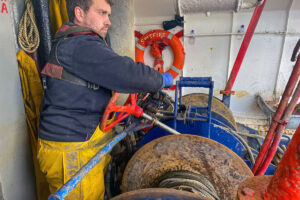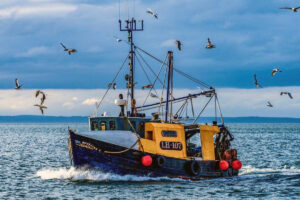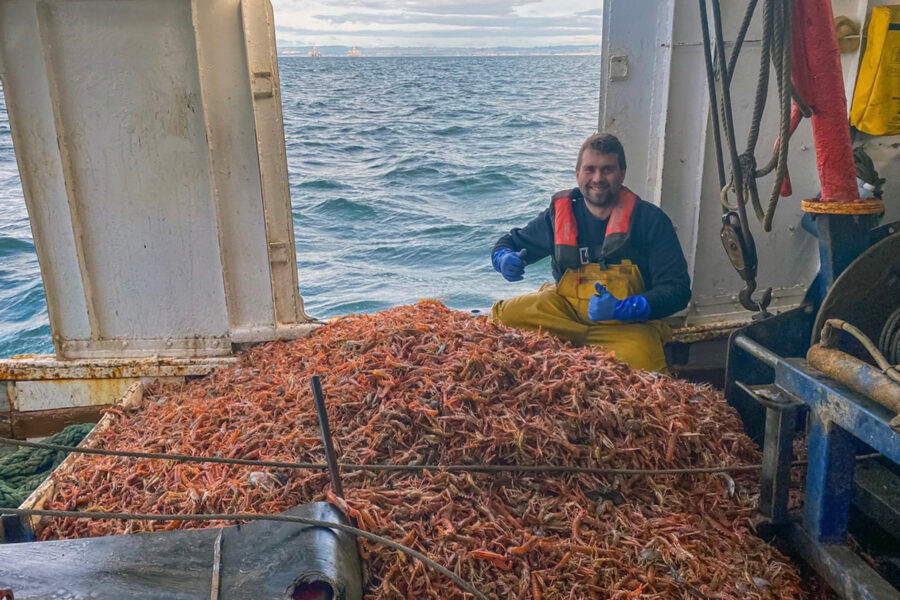Share a day in the working life of the Dunbar prawn skipper who was named Fishing News Awards Young Fisherman of the Year 2022
For some, being surrounded by plentiful amounts of freshly caught prawns on a daily basis might diminish enthusiasm for eating them. It’s quite the opposite in the case of 26-year-old Rowan Davies, who skippers a traditional prawn trawler out of Dunbar on Scotland’s North Sea coast.
“I really enjoy eating them. I could eat seafood every day, all day. I’m a big seafood person and always have been,” said Rowan, whose catch is all exported to the Continent. “When people go abroad on holiday, they don’t realise that they’re eating Scottish langoustine, caught by Scottish fishermen.”
In terms of being a ‘Scottish fisherman’, Rowan and his boat, Spitfire LH 107, certainly have the heritage.
“The boat has been completely in the family since she was launched in 1974 at Dunbar. She was the second-to-last boat to be built in Dunbar before the boatyard closed down,” he said.
“She is currently the last Dunbar-built boat that’s still floating. All the rest have sunk or been decommissioned.
“When we sometimes move to the inner harbour, which is where she was launched, I get the chance to moor her outside the actual slipway where she launched – it’s quite a picture.”

Rowan on the first haul of the day. He says his vessel Spitfire, which celebrates its 50th anniversary next year, ‘has a wee bit of character’. “Everybody in Dunbar knows the boat. Every time you go back into the harbour after a day’s work, there’s always somebody who comes up to you on the quayside and asks you about the boat.”
With the boat nearing her 50th anniversary, she has plenty of stories to tell. “She sank in Dunbar harbour once, in the early 2000s. A wee bit of stick floated into the hole for the electric pump, and it jammed the valve and the water just syphoned back in and she sank in the harbour. They had to get a big crane to lift her out the water. After that she was given a full refit.
“At the time my grandad was offered a brand spanking new steel boat that wasn’t even built yet for £250,000, but he said no. He said he wanted to do up the Spitfire – and we’re still with her.”
Following in the footsteps of his grandfather and father, Rowan – who was last year named Young Fisherman of the Year at the Fishing News Awards – assumed stewardship of the Spitfire six months ago.
“Being skipper has been a lot more stressful than I thought it was going to be! It’s a lot more mentally demanding than physically demanding – planning, tides, winds, all of that kind of thing.
“We’re doing well, though, and we’re up on wages compared to last year.”
During the winter, Rowan’s day normally begins between 3am and 4am. “I head down to the boat and get the engine started and warmed up, and then get all the electronic equipment on – my plotters, radar, radio…”
His two crew arrive at the quayside a short while later. “One has been with me for two years, and the other, who has eight years’ experience, since I took over six months ago.
“They’ll arrive and do their jobs, and get the nets ready to shoot. Then we’ll undo the mooring ropes and steam towards the fishing ground.”
When it comes to choosing grounds, Rowan says it’s ‘a bit of a gamble’. “It’s hit and miss. We’ve been quite lucky the last couple of weeks, when we’ve been fishing and catching mainly in the same area. We also go by tides, weather conditions, swell, wind, all that kind of thing – and, obviously, where the prawns are!”

Heading for retirement? Spitfire LH 107, a 1974-built traditional prawn trawler, was the second-last vessel built in Dunbar before closure of the town’s boatyard. “I’d love to keep her going, but she’s just starting to show her age. We’ve spent a lot of money on her over the last few years. I would say we’ve got about six or seven good years left before we have to start properly thinking about what we’re going to do with the business side of things.”
Once they arrive at the grounds, the first of the day’s three hauls gets underway. “The crew chuck the codends over the side, then we shoot out our sweeps, put the trawl doors on and shoot them out, and then shoot the wire – and then we start towing. We tow for about three to four hours per haul.
“We repeat that process three times a day, every day.”
Between hauls, Rowan and his crew grade the prawns into three sizes. “The small ones get tailed, and then you get medium and large. That all gets graded by hand – and that can take up to five to six hours at a time.
“They all get washed with a deck hose and put into boxes and packaged.”
When the nets have been brought onboard from the final haul, Rowan begins the steam back into Dunbar, arriving in port for 7pm to meet the waiting lorry from Eyemouth-based wholesaler DR Collin & Son. During the summer, when night fishing starts, collection switches to 7am.
Once the vessel tied up, the catch is landed and transferred to the lorry. “And that’s us done for the day.”
For the catch, the journey is only just beginning. After leaving Eyemouth, the lorry travels south to Dover, and onwards to Spain.
It’s a trip Rowan hopes to make himself one day. “I would love to follow a box of my prawns just to see where it actually ends up,” he said. “I’ve always wanted to do that.”
Next week: Share a day in the life of Cefas scientist Richard Buck
The 2023 Fishing News Awards will be taking place on 11 May 2023 in Aberdeen. Book your tickets here.








